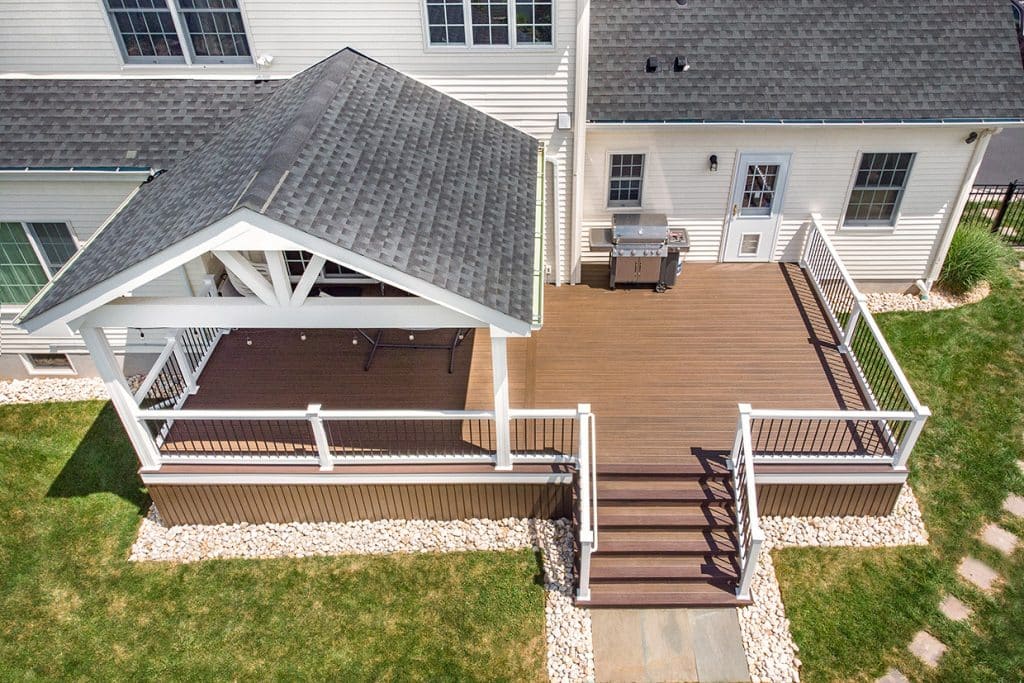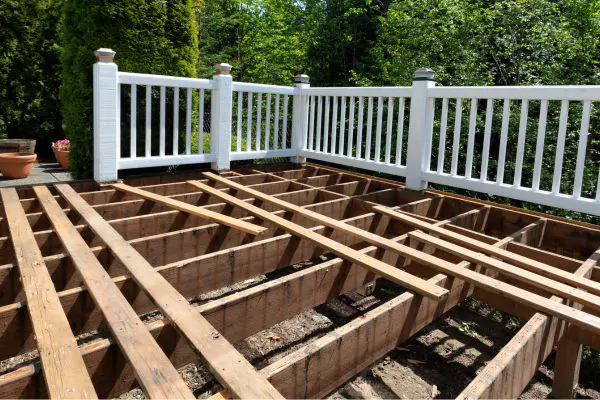Enhance Your Outdoor Living Space With Top Deck Materials
Creating an inviting outdoor home that effortlessly combines with nature needs thoughtful consideration of the materials utilized for your deck. The option of deck materials can dramatically influence the appearances, resilience, and upkeep needs of your outside sanctuary. From the modern-day charm of composite decking to the classic beauty of all-natural wood options, each material provides distinct benefits to improve your outdoor sanctuary. Comprehending the essential features and advantages of top deck materials is vital in making a notified choice that matches your lifestyle and boosts your outdoor experience.
Benefits of Compound Decking
Composite decking uses a low-maintenance and resilient choice to traditional timber decking materials - Trex Decking. Made from a mix of timber fibers and recycled plastic, composite decking is designed to endure the components and resist fading, discoloration, and mold development. One of the key advantages of composite decking is its long life, as it does not warp, crack, or splinter like timber decking, guaranteeing a secure and smooth surface area for years to find
Along with its durability, composite outdoor decking requires very little upkeep compared to timber outdoor decking. With no need for discoloration, securing, or paint, composite decking simplifies maintenance tasks, conserving homeowners money and time in the future. Its resistance to dampness and pests likewise adds to its low-maintenance nature, making it a perfect option for those looking for a hassle-free deck product.

Advantages of Natural Timber Decks
Natural wood decks use an ageless beauty and genuine aesthetic that enhances exterior areas with their organic elegance and heat. One of the main advantages of natural timber decks is their all-natural charm. Each item of wood has an unique grain pattern and shade, adding a distinctive personality to your outdoor living area. Additionally, all-natural wood decks can be tarnished or painted in various tones to suit various designs and choices, offering flexibility in design selections.
Resilience is one more essential benefit of all-natural timber decks. Timber decks can endure the components and last for several years when properly maintained and sealed. Wood decks additionally have a natural resilience to hefty foot traffic and furnishings, making them a reliable option for outside celebrations and tasks. In addition, natural timber is a renewable energy, making it an eco friendly alternative for eco-conscious property owners.

Top Features of PVC Decking
When taking into consideration decking alternatives, one can not ignore the phenomenal functions that PVC decking offers outdoor spaces. PVC decking, also called vinyl outdoor decking, provides a range of benefits that make it visit the site a popular selection among homeowners. Among the top features of PVC outdoor decking is its sturdiness. Unlike natural timber decks, PVC decks are resistant to rotting, bending, splintering, and insect damages, making certain a long lifespan with very little maintenance.
Another secret attribute of PVC decking is its low upkeep needs. PVC decks do not call for staining, sealing, or painting like timber decks, making them a practical alternative for those wanting to appreciate their exterior space without the headache of normal upkeep. Additionally, PVC decking is readily available in a wide range of styles and colors, enabling home owners to tailor their deck to suit their aesthetic preferences.
Moreover, PVC outdoor decking is highly resistant to moisture, making it an optimal option for exterior rooms revealed to rainfall, snow, or humidity. This moisture resistance assists protect against mold and mildew and mold development, maintaining the deck surface area tidy and risk-free for satisfaction. In general, the top features of PVC decking make it a durable, low-maintenance, and aesthetically pleasing option for enhancing outdoor living spaces.
Enhancing Your Deck With Light Weight Aluminum Products

One of the key benefits of utilizing aluminum products for your deck is their toughness. Aluminum does not warp, fracture, or splinter like timber, and it can stand up to the elements without wearing away. This durability makes certain that your deck will certainly maintain its elegance and performance for many years to come.
In enhancement to their sturdiness, light weight aluminum materials can additionally improve the overall appearance of your outside home (Trex Decking). Offered in a variety of shades and finishes, light weight aluminum decking can match any style aesthetic, from modern to standard. Its sleek appearance includes a touch of elegance to your deck, developing a trendy and modern-day outdoor retreat
In addition, light weight aluminum decking is eco-friendly as it is commonly made from recycled materials and is completely recyclable at the end of its life-span. This sustainable aspect makes it a prominent selection for eco-conscious property owners aiming to enhance their outdoor areas with a sturdy and attractive deck remedy.
Selecting the Right Deck Product
With an emphasis on sturdiness, aesthetics, and sustainability in mind, selecting the ideal deck product is essential for creating a visually attractive and durable exterior living space. When choosing the optimal deck material, think about variables such as upkeep needs, resistance to components, eco-friendliness, and overall cost.
Timber remains a classic choice, offering an all-natural feel and look. Cedar and redwood are popular options due to their natural resistance to decay and insects. They require routine upkeep to stop bending and decomposing.
Composite decking, made from a blend of wood fibers and recycled plastic, provides a low-maintenance choice with excellent toughness and resistance to fading, discoloration, and scraping.
For a more eco-conscious choice, take into consideration bamboo outdoor decking, recognized for its sustainability and stamina. Bamboo grows rapidly, making it a renewable energy. It is vital to ensure the bamboo outdoor decking is sourced from properly managed forests.
Inevitably, the ideal deck material will certainly depend upon your priorities, budget, and wanted aesthetics, so consider these elements carefully prior to making a decision.
Verdict
To conclude, selecting the ideal deck material is essential for boosting your outside home. Each sort of product, whether it be composite, all-natural timber, PVC, or light weight aluminum, offers unique advantages and benefits. By thoroughly considering your choices and find this needs, you can develop a beautiful and useful deck that will include value to your home and provide a comfortable room for relaxation and entertainment. Select carefully to appreciate your outdoor area for several years to come.
Compound outdoor decking uses a long lasting and low-maintenance alternative to conventional wood decking materials. One of the crucial advantages of composite outdoor decking is its long life, as it does not warp, split, or splinter like timber outdoor decking, ensuring a risk-free and smooth surface for years to come.
In addition to its toughness, composite outdoor decking calls for marginal maintenance compared to wood decking. Unlike natural wood decks, PVC decks are resistant to decaying, warping, splintering, and pest damages, making certain a lengthy life expectancy with very little upkeep.
PVC decks do not call for discoloration, sealing, or painting like wood decks, making them a convenient option for those looking to appreciate their exterior area without the headache of routine upkeep.